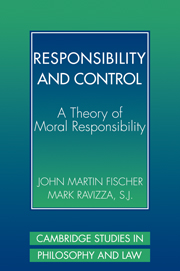Book contents
- Frontmatter
- Contents
- Acknowledgments
- 1 Moral Responsibility: The Concept and the Challenges
- 2 Moral Responsibility for Actions: Weak Reasons-Responsiveness
- 3 Moral Responsibility for Actions: Moderate Reasons-Responsiveness
- 4 Responsibility for Consequences
- 5 Responsibility for Omissions
- 6 The Direct Argument for Incompatibilism
- 7 Responsibility and History
- 8 Taking Responsibility
- 9 Conclusion
- Bibliography
- Index
2 - Moral Responsibility for Actions: Weak Reasons-Responsiveness
Published online by Cambridge University Press: 05 June 2012
- Frontmatter
- Contents
- Acknowledgments
- 1 Moral Responsibility: The Concept and the Challenges
- 2 Moral Responsibility for Actions: Weak Reasons-Responsiveness
- 3 Moral Responsibility for Actions: Moderate Reasons-Responsiveness
- 4 Responsibility for Consequences
- 5 Responsibility for Omissions
- 6 The Direct Argument for Incompatibilism
- 7 Responsibility and History
- 8 Taking Responsibility
- 9 Conclusion
- Bibliography
- Index
Summary
INTRODUCTION
In order to give a comprehensive theory of moral responsibility, we need to attend to the full range of items for which agents are typically held morally responsible. The full “content” of moral responsibility ascriptions – “what we hold individuals morally responsible for” – includes, at least, actions, failures to act (or omissions), and the consequences of those actions and omissions. Let us begin our overall project by beginning to give an account of the freedom-relevant condition for moral responsibility for actions. In the following chapter, we shall further elaborate and refine the approach sketched here.
In Chapter 1 we developed a set of challenges based on causal determinism to the intuitive and natural picture of ourselves as having a certain sort of control. This sort of control implies that we have various genuinely open pathways branching into the future (at least at certain important points in our lives). The challenges – modal and nonmodal – are very potent and distressing. They suggest the rather startling thought that we may not in fact have the sort of control that implies alternative possibilities. And if moral responsibility and personhood require this sort of control, it is not clear that we can legitimately hold each other morally responsible for our behavior. Perhaps it is then advisable to ask about the control requirement for moral responsibility rather more carefully. Do we really require the sort of control that involves alternative possibilities? Would its absence imply that we are not relevantly different from mere brutes or fancy machines?
- Type
- Chapter
- Information
- Responsibility and ControlA Theory of Moral Responsibility, pp. 28 - 61Publisher: Cambridge University PressPrint publication year: 1998
- 2
- Cited by

